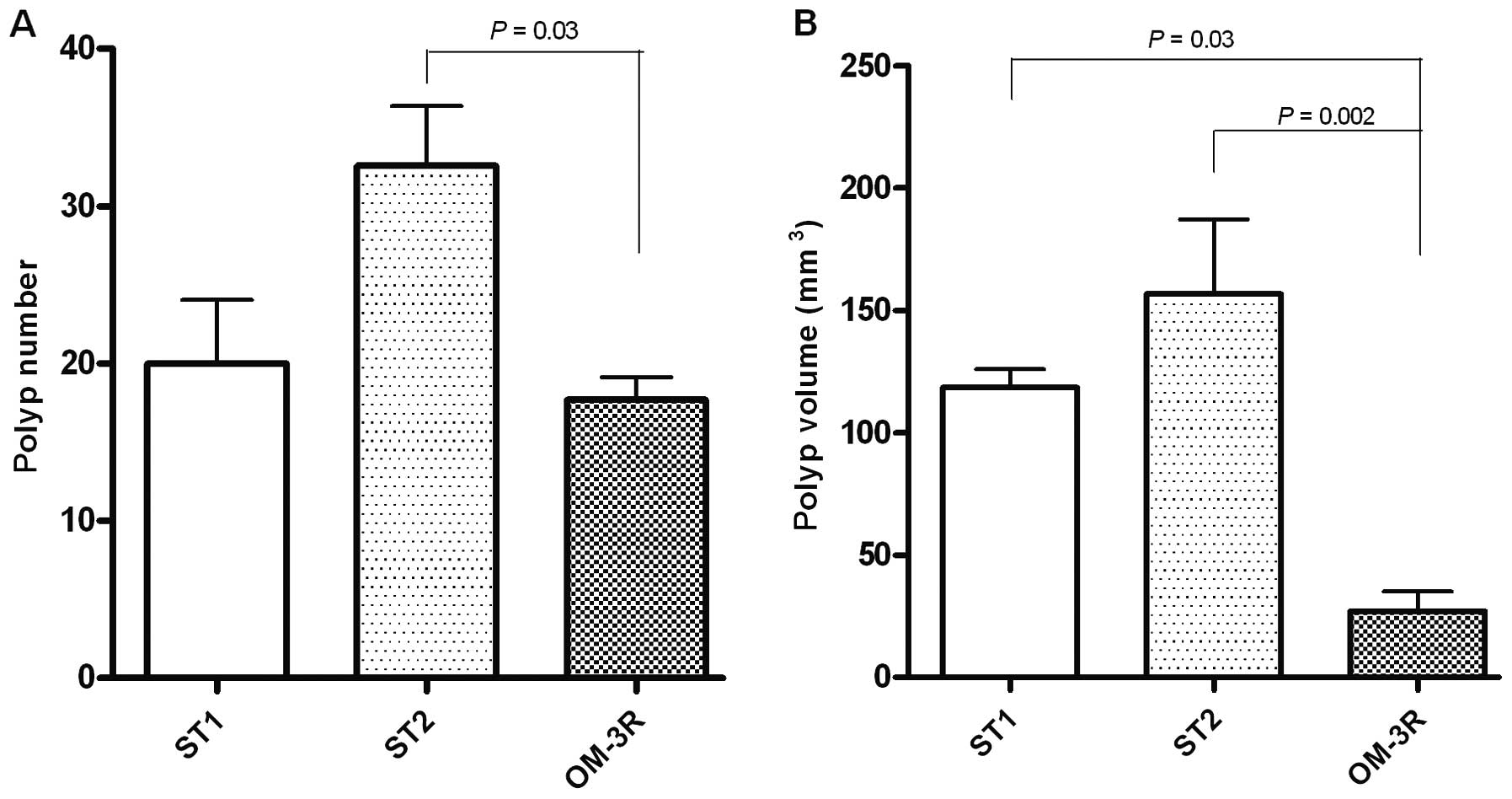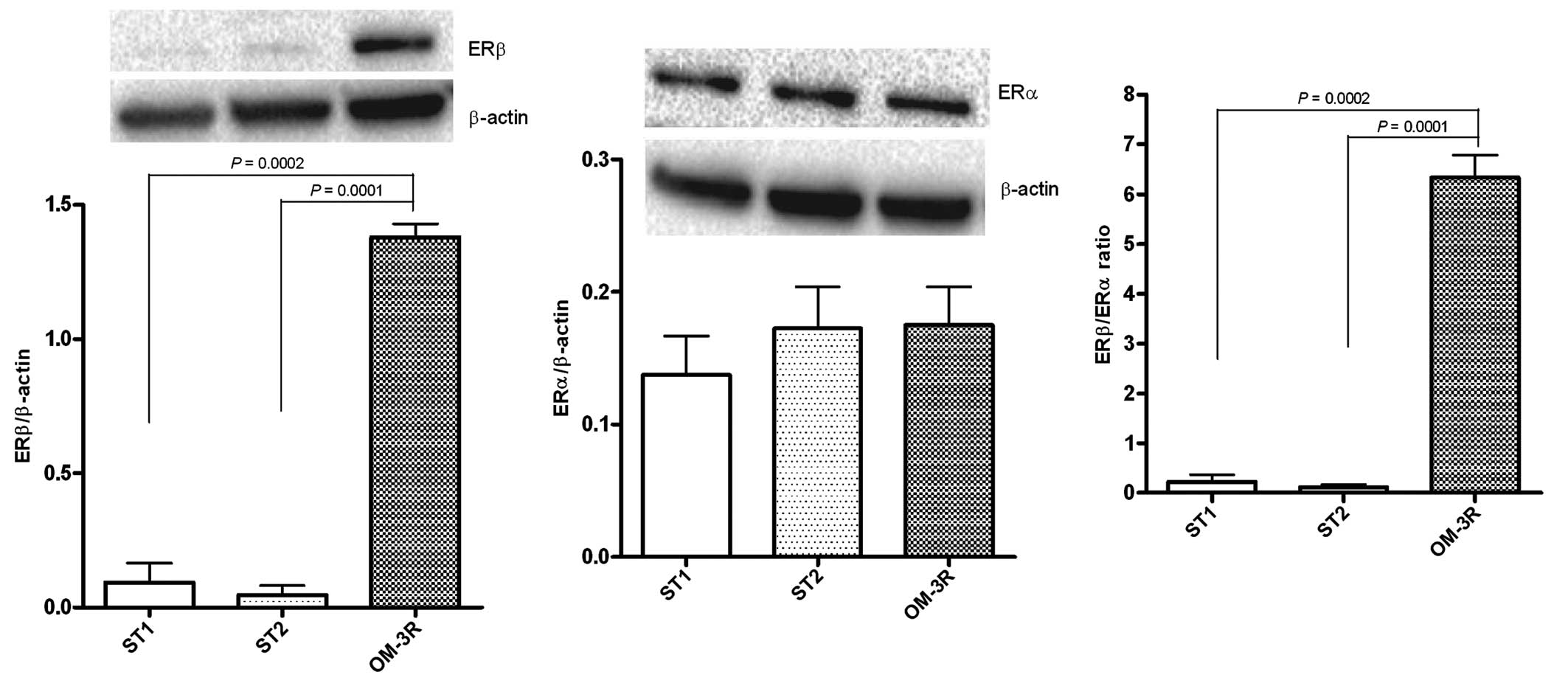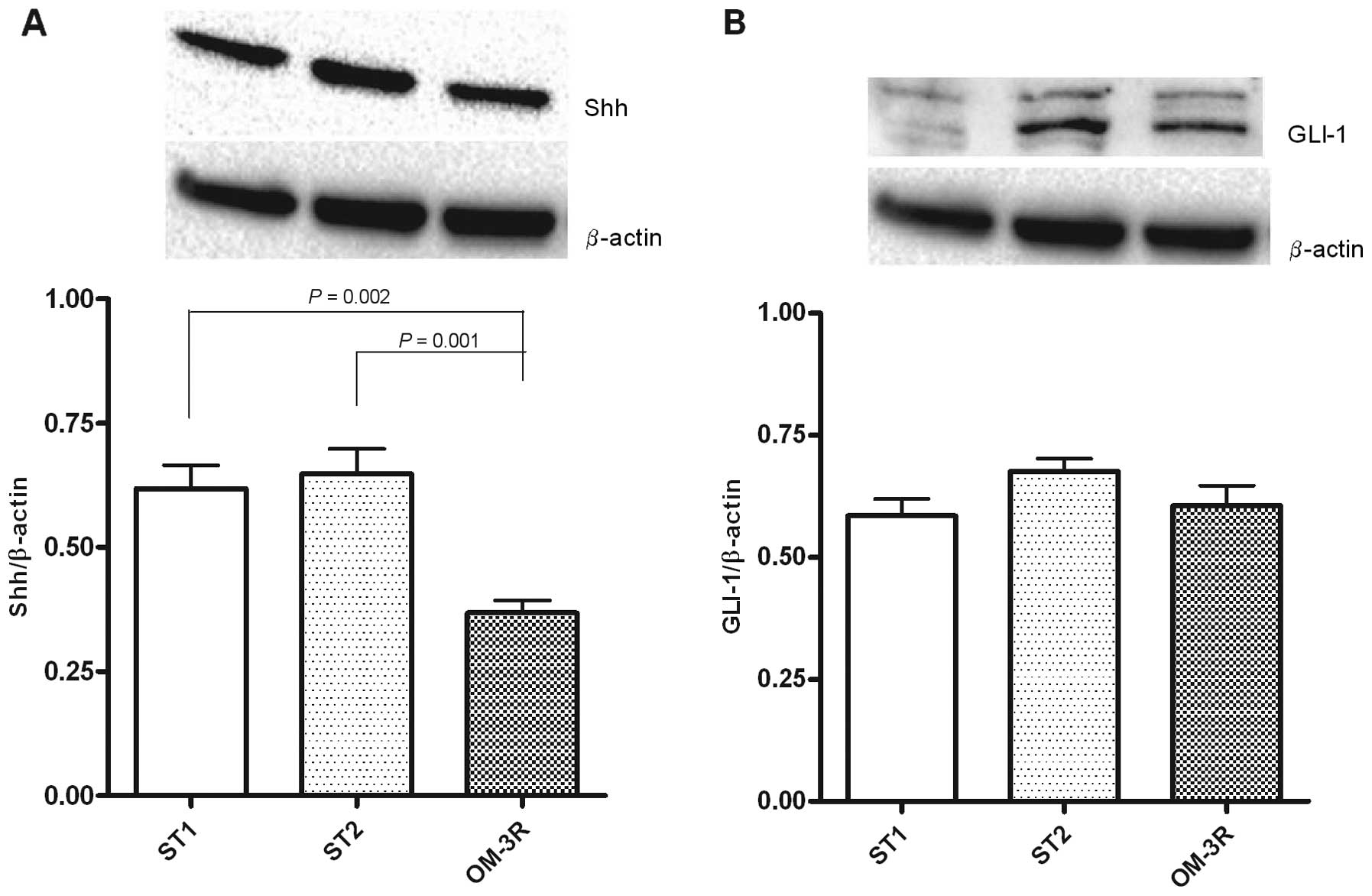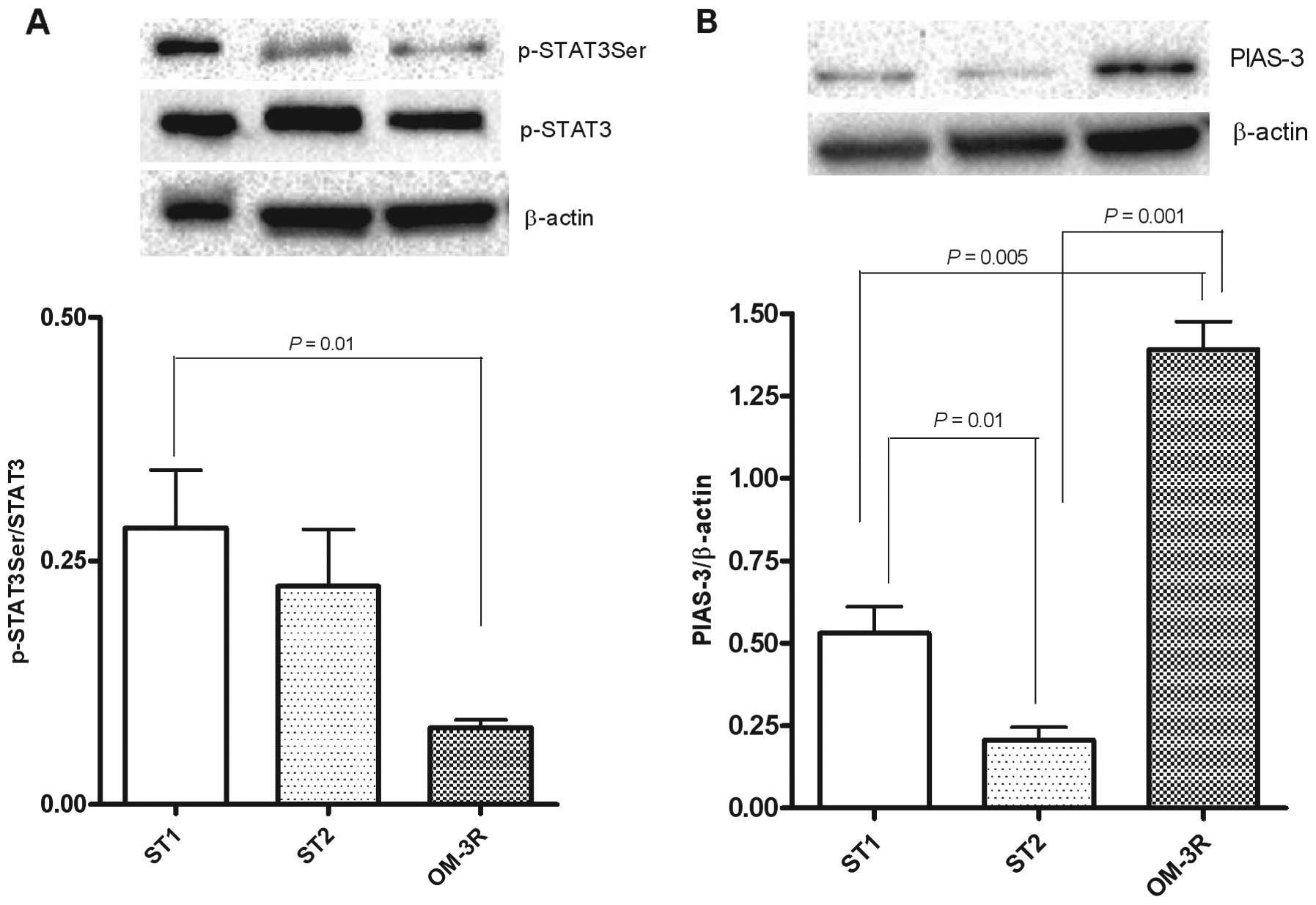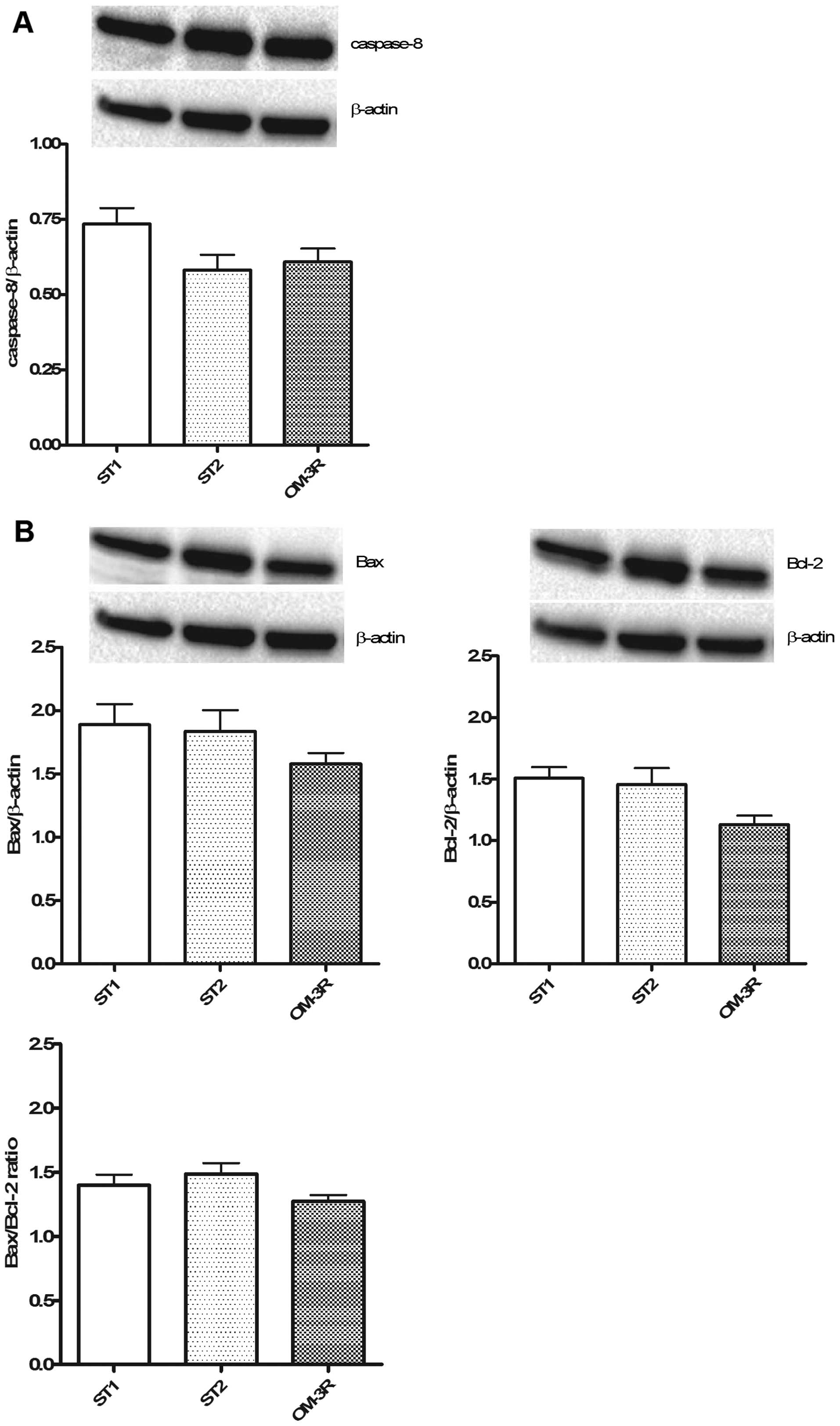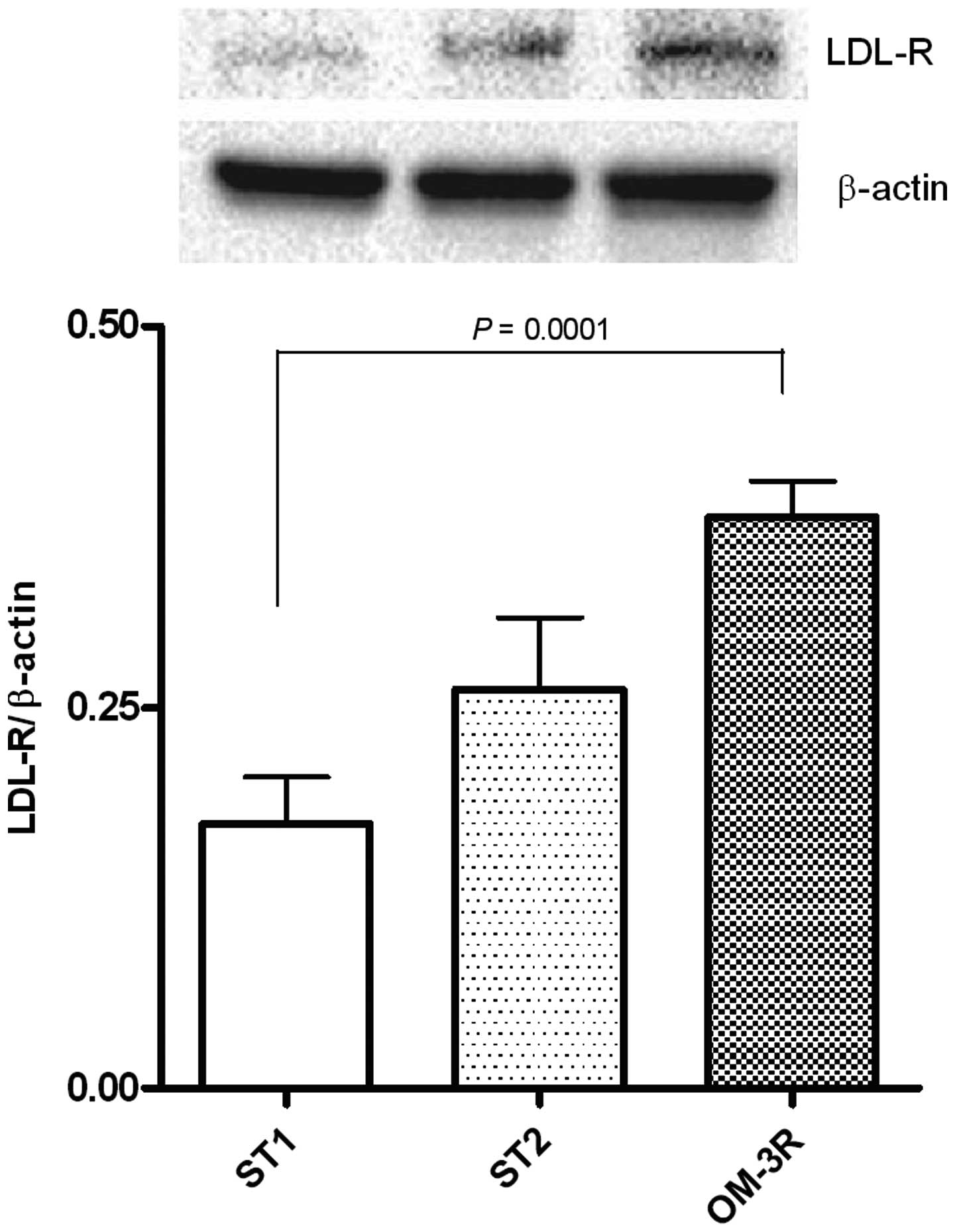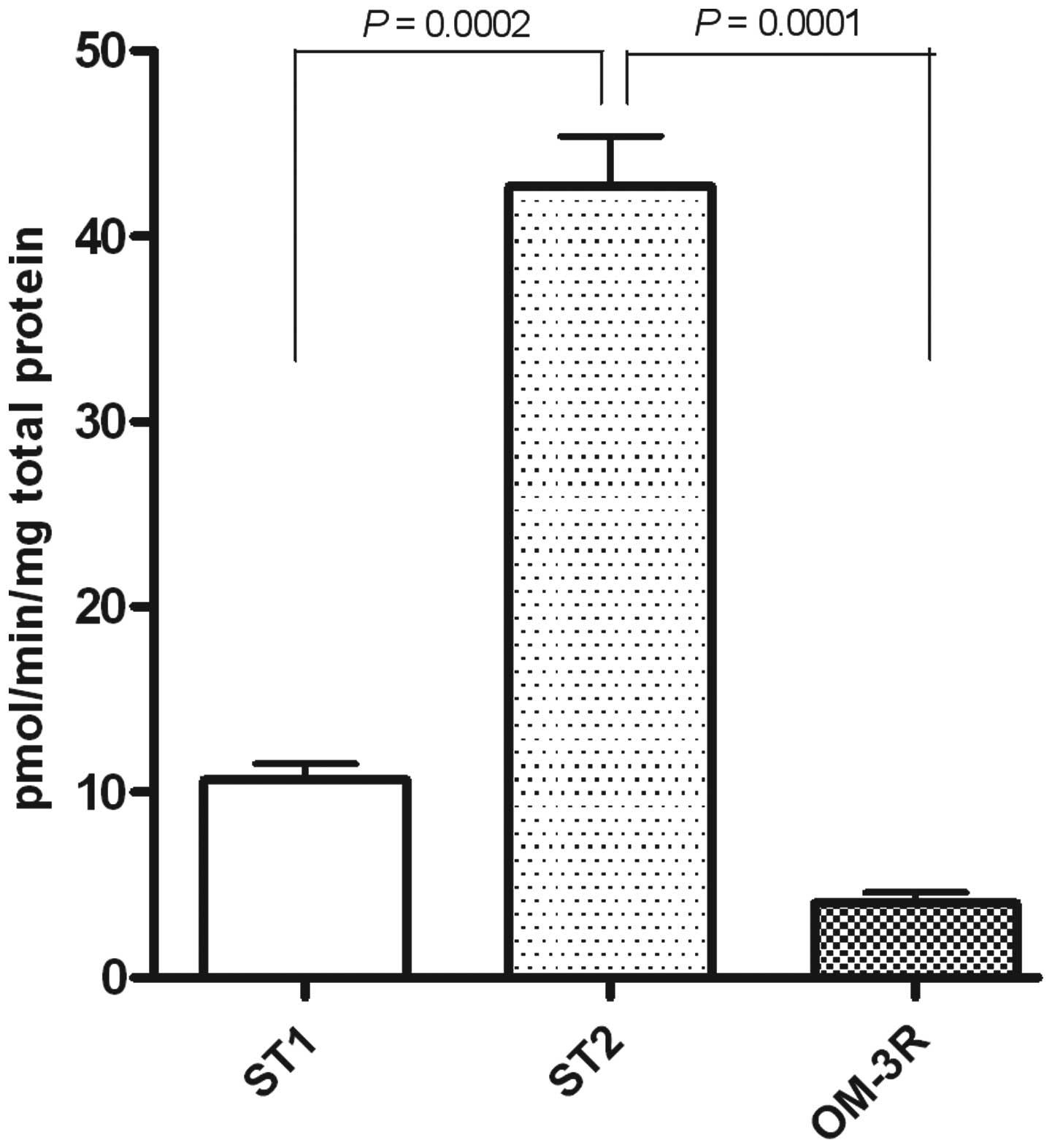|
1
|
Caygill CP, Charlett A and Hill MJ: Fat,
fish, fish oil and cancer. Br J cancer. 74:159–164. 1996.
View Article : Google Scholar : PubMed/NCBI
|
|
2
|
Kato I, Akhmedkhanov A, Koenig K, Toniolo
PG, Shore RE and Riboli E: Prospective study of diet and female
colorectal cancer: The New York University Women's Health Study.
Nutr Cancer. 28:276–281. 1997. View Article : Google Scholar : PubMed/NCBI
|
|
3
|
Dupertuis YM, Meguid MM and Pichard C:
Colon cancer therapy: New perspectives of nutritional manipulations
using polyunsaturated fatty acids. Curr Opin Clin Nutr Metab Care.
10:427–432. 2007. View Article : Google Scholar : PubMed/NCBI
|
|
4
|
Chapkin RS, Seo J, McMurray DN and Lupton
JR: Mechanisms by which docosahexaenoic acid and related fatty
acids reduce colon cancer risk and inflammatory disorders of the
intestine. Chem Phys Lipids. 153:14–23. 2008. View Article : Google Scholar : PubMed/NCBI
|
|
5
|
Petrik MB, McEntee MF, Chiu CH and Whelan
J: Antagonism of arachidonic acid is linked to the antitumorigenic
effect of dietary eicosapentaenoic acid in Apc(Min/+) mice. J Nutr.
130:1153–1158. 2000.PubMed/NCBI
|
|
6
|
Fini L, Piazzi G, Ceccarelli C, Daoud Y,
Belluzzi A, Munarini A, Graziani G, Fogliano V, Selgrad M, Garcia
M, et al: Highly purified eicosapentaenoic acid as free fatty acids
strongly suppresses polyps in Apc(Min/+) mice. Clin Cancer Res.
16:5703–5711. 2010. View Article : Google Scholar : PubMed/NCBI
|
|
7
|
West NJ, Clark SK, Phillips RK, Hutchinson
JM, Leicester RJ, Belluzzi A and Hull MA: Eicosapentaenoic acid
reduces rectal polyp number and size in familial adenomatous
polyposis. Gut. 59:918–925. 2010. View Article : Google Scholar : PubMed/NCBI
|
|
8
|
Notarnicola M, Messa C, Refolo MG, Tutino
V, Miccolis A and Caruso MG: Polyunsaturated fatty acids reduce
fatty acid synthase and hydroxy-methyl-glutaryl CoA-reductase gene
expression and promote apoptosis in HepG2 cell line. Lipids Health
Dis. 10:102011. View Article : Google Scholar : PubMed/NCBI
|
|
9
|
Barone M, Notarnicola M, Caruso MG, Scavo
MP, Viggiani MT, Tutino V, Polimeno L, Pesetti B, Di Leo A and
Francavilla A: Olive oil and omega-3 polyunsaturated fatty acids
suppress intestinal polyp growth by modulating the apoptotic
process in ApcMin/+ mice. Carcinogenesis. 35:1613–1619.
2014. View Article : Google Scholar : PubMed/NCBI
|
|
10
|
Di Leo A, Barone M, Maiorano E, Tanzi S,
Piscitelli D, Marangi S, Lofano K, Ierardi E, Principi M and
Francavilla A: ER-beta expression in large bowel adenomas:
Implications in colon carcinogenesis. Dig Liver Dis. 40:260–266.
2008. View Article : Google Scholar
|
|
11
|
Barone M, Tanzi S, Lofano K, Scavo MP,
Pricci M, Demarinis L, Papagni S, Guido R, Maiorano E, Ingravallo
G, et al: Dietary-induced ERbeta upregulation counteracts
intestinal neoplasia development in intact male ApcMin/+
mice. Carcinogenesis. 31:269–274. 2010. View Article : Google Scholar
|
|
12
|
Barone M, Scavo MP, Papagni S, Piscitelli
D, Guido R, Di Lena M, Comelli MC and Di Leo A: ERβ expression in
normal, adenomatous and carcinomatous tissues of patients with
familial adenomatous polyposis. Scand J Gastroenterol.
45:1320–1328. 2010. View Article : Google Scholar : PubMed/NCBI
|
|
13
|
Konstantinopoulos PA, Kominea A, Vandoros
G, Sykiotis GP, Andricopoulos P, Varakis I, Sotiropoulou-Bonikou G
and Papavassiliou AG: Oestrogen receptor beta (ERbeta) is
abundantly expressed in normal colonic mucosa, but declines in
colon adenocarcinoma paralleling the tumour's dedifferentiation.
Eur J cancer. 39:1251–1258. 2003. View Article : Google Scholar : PubMed/NCBI
|
|
14
|
Rudolph A, Toth C, Hoffmeister M, Roth W,
Herpel E, Jansen L, Marx A, Brenner H and Chang-Claude J:
Expression of oestrogen receptor β and prognosis of colorectal
cancer. Br J Cancer. 107:831–839. 2012. View Article : Google Scholar : PubMed/NCBI
|
|
15
|
Weihua Z, Andersson S, Cheng G, Simpson
ER, Warner M and Gustafsson JA: Update on estrogen signaling. FEBS
Lett. 546:17–24. 2003. View Article : Google Scholar : PubMed/NCBI
|
|
16
|
Thomas C and Gustafsson JÅ: The different
roles of ER subtypes in cancer biology and therapy. Nat Rev Cancer.
11:597–608. 2011. View
Article : Google Scholar : PubMed/NCBI
|
|
17
|
Kameda C, Nakamura M, Tanaka H, Yamasaki
A, Kubo M, Tanaka M, Onishi H and Katano M: Oestrogen receptor-α
contributes to the regulation of the hedgehog signalling pathway in
ERalpha-positive gastric cancer. Br J Cancer. 102:738–747. 2010.
View Article : Google Scholar : PubMed/NCBI
|
|
18
|
Wang H, Li YY, Wu YY and Nie YQ:
Expression and clinical significance of hedgehog signaling pathway
related components in colorectal cancer. Asian Pac J cancer Prev.
13:2319–2324. 2012. View Article : Google Scholar : PubMed/NCBI
|
|
19
|
Bian YH, Huang SH, Yang L, Ma XL, Xie JW
and Zhang HW: Sonic hedgehog-Gli1 pathway in colorectal
adenocarcinomas. World J Gastroenterol. 13:1659–1665. 2007.
View Article : Google Scholar : PubMed/NCBI
|
|
20
|
Gulino A, Ferretti E and De Smaele E:
Hedgehog signalling in colon cancer and stem cells. EMBO Mol Med.
1:300–302. 2009. View Article : Google Scholar
|
|
21
|
Notarnicola M, Messa C, Pricci M, Guerra
V, Altomare DF, Montemurro S and Caruso MG: Up-regulation of
3-hydroxy-3-methyl glutaryl coenzyme A reductase activity in
left-sided human colon cancer. Anticancer Res. 24:3837–3842.
2004.
|
|
22
|
Caruso MG and Notarnicola M: Biochemical
changes of mevalonate pathway in human colorectal cancer.
Anticancer Res. 25:3393–3397. 2005.PubMed/NCBI
|
|
23
|
Swinnen JV, Brusselmans K and Verhoeven G:
Increased lipo-genesis in cancer cells: New players, novel targets.
Curr Opin Clin Nutr Metab Care. 9:358–365. 2006. View Article : Google Scholar : PubMed/NCBI
|
|
24
|
Notarnicola M, Miccolis A, Tutino V,
Lorusso D and Caruso MG: Low levels of lipogenic enzymes in
peritumoral adipose tissue of colorectal cancer patients. Lipids.
47:59–63. 2012. View Article : Google Scholar
|
|
25
|
Goodman WA, Young AB, McCormick TS, Cooper
KD and Levine AD: Stat3 phosphorylation mediates resistance of
primary human T cells to regulatory T cell suppression. J Immunol.
186:3336–3345. 2011. View Article : Google Scholar : PubMed/NCBI
|
|
26
|
Gao SP, Mark KG, Leslie K, Pao W, Motoi N,
Gerald WL, Travis WD, Bornmann W, Veach D, Clarkson B, et al:
Mutations in the EGFR kinase domain mediate STAT3 activation via
IL-6 production in human lung adenocarcinomas. J Clin Invest.
117:3846–3856. 2007. View
Article : Google Scholar : PubMed/NCBI
|
|
27
|
Koukos G, Polytarchou C, Kaplan JL,
Morley-Fletcher A, Gras-Miralles B, Kokkotou E, Baril-Dore M,
Pothoulakis C, Winter HS and Iliopoulos D: MicroRNA-124 regulates
STAT3 expression and is down-regulated in colon tissues of
pediatric patients with ulcerative colitis. Gastroenterology.
145:842–52.e2. 2013. View Article : Google Scholar : PubMed/NCBI
|
|
28
|
Behera R, Kumar V, Lohite K, Karnik S and
Kundu GC: Activation of JAK2/STAT3 signaling by osteopontin
promotes tumor growth in human breast cancer cells. Carcinogenesis.
31:192–200. 2010. View Article : Google Scholar
|
|
29
|
Borghouts C, Tittmann H, Delis N,
Kirchenbauer M, Brill B and Groner B: The intracellular delivery of
a recombinant peptide derived from the acidic domain of PIAS3
inhibits STAT3 transactivation and induces tumor cell death. Mol
Cancer Res. 8:539–553. 2010. View Article : Google Scholar : PubMed/NCBI
|
|
30
|
Pettan-Brewer C, Morton J, Mangalindan R
and Ladiges W: Curcumin suppresses intestinal polyps in APC Min
mice fed a high fat diet. Pathobiol Aging Age Relat Dis.
1:70132011.
|
|
31
|
Notarnicola M, Messa C, Refolo MG, Tutino
V, Miccolis A and Caruso MG: Synergic effect of eicosapentaenoic
acid and lovastatin on gene expression of HMGCoA reductase and LDL
receptor in cultured HepG2 cells. Lipids Health Dis. 30:1352010.
View Article : Google Scholar
|
|
32
|
Caruso MG, Notarnicola M, Santilo MR,
Cavallini A and Di Leo A: Enhanced 3-hydroxy-3-methyl-glutaryl
coenzyme a reductase activity in human colorectal cancer not
expressing low density lipoprotein receptor. Anticancer Res.
19:451–454. 1999.PubMed/NCBI
|















